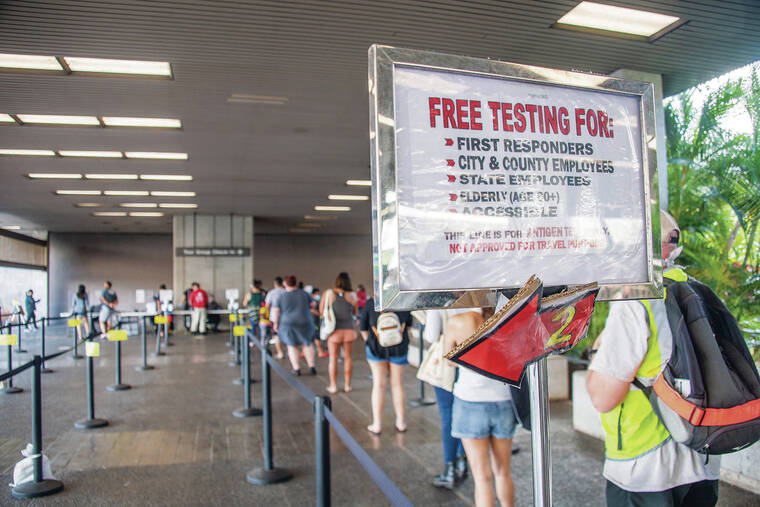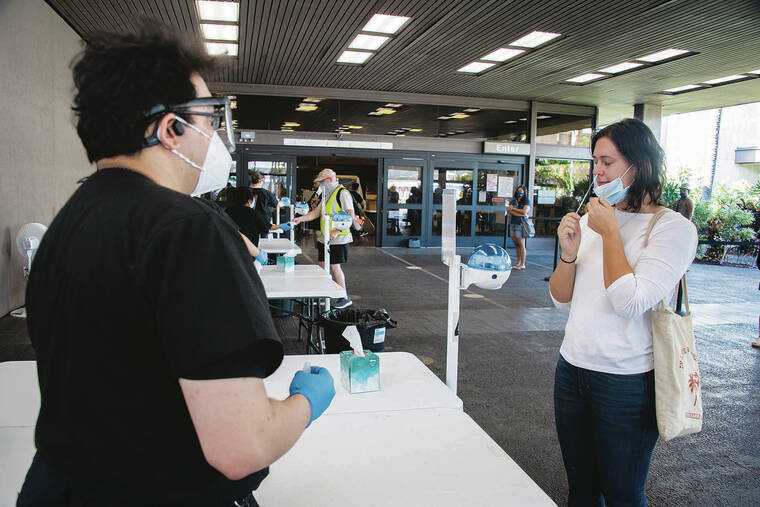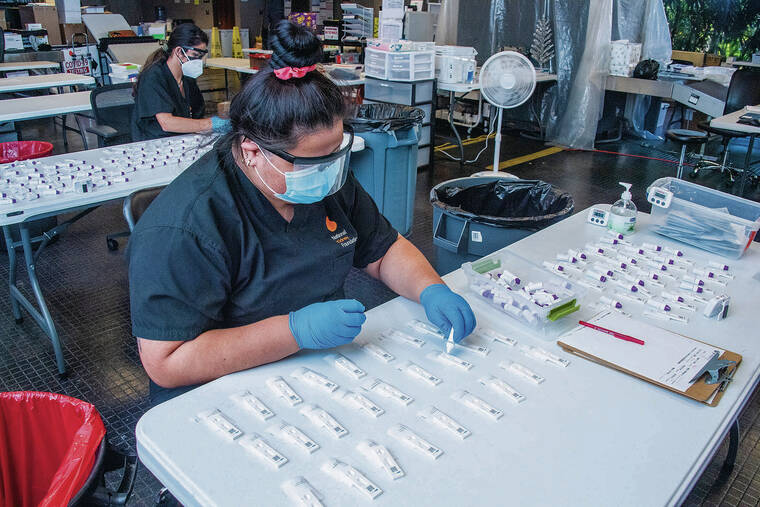COVID-19 testing has increased during the past two weeks at Daniel K. Inouye International Airport with the holidays fast approaching and a surge in infections that’s already worse than last year at this time.
On Sunday, state Department of Health officials reported 972 new confirmed and probable infections statewide, bringing the state’s totals since the start of the pandemic to 1,072 fatalities and 92,746 cases.
Sunday’s count eclipsed the statewide case count of 797 on Friday and 707 on Saturday. Last year on the Friday and Saturday before Christmas, there were 206 and 132 new COVID-19 cases, respectively, according to state Department of Health data.
The National Kidney Foundation of Hawaii Consortium runs the COVID-19 testing site at the airport, its busiest location. The site conducted 1,134 tests Sunday and 1,192 tests Saturday, higher than the 500 or so daily tests provided before the omicron variant was detected in Hawaii on Dec. 2.
On Friday, 1,200 tests were administered there, and with the number of coronavirus cases remaining high, even more people are expected to come in for testing, according to Frank Bermudez, project operations manager for the consortium.
A majority of those who have been getting tested are isle residents, he said.
“It’s a … priority for most to feel at ease with their own COVID status, and particularly when they’re spending more time with their loved ones,” Bermudez said, “and now with Christmas coming around the corner, and after that it’s going to be New Year’s.”
Some people waiting at the airport testing site Saturday were there because they were unvaccinated and needed tests for work or travel, while others were getting tested ahead of gatherings or events.
Ewa Beach resident Jared Thomas said he had been exposed to a co-worker who tested positive for the virus.
“I live with my grandma, so I’ve got to make sure everything is good, more for her health than mine,” Thomas said.
DOH spokesman Brooks Baehr said testing, in general, has increased during at least the past few days. He attributed the increased demand to the spike in case counts, the arrival of the omicron variant, the loosening of restrictions, increased travel, larger gatherings and the upcoming holidays.
“You’ve got a recipe for increased case counts, and that’s exactly what we’ve got. And with the increased case counts will come a demand for more testing,” Baehr said.
The DOH urges anyone who feels sick, vaccinated or not, to get tested and take necessary precautions to avoid possibly exposing others to the coronavirus.
“If you’ve got symptoms, if you feel sick, please go get yourself tested,” Baehr said. “If you’ve come into contact with someone who’s COVID- positive, please get yourself tested regardless of your vaccination status. If you feel sick, if you’ve got symptoms, stay home — don’t go to work, don’t go to school, avoid crowds, get tested.”
Additionally, Baehr advised people to plan ahead for possible illness by designating a room at home to isolate in if necessary and identify people who will provide food while in isolation.
Bermudez recommended that anyone who wants to get tested for COVID-19 to pre-register online to streamline the process. He also said wait times at the airport site have been longer at the end of the day, and added he’s had to turn some people away if they come too late.
Meantime, the DOH on Sunday urged anyone who attended Dec. 10 or 11 concerts at The Republik to get tested as officials investigate a cluster of 30 COVID-19 cases tied to the nightclub.
State health officials said 30 patrons and employees at the nightclub on Dec. 10 or 11 tested positive.
“Anyone with COVID-19 symptoms, even mild symptoms, is asked to stay home from work, school and other activities. They should avoid other people and get tested,” according to an email from state health officials.
Between 900 and 1,000 people visited the nightclub each night, state health officials said. Attendees were required to show proof of full vaccination status or a negative COVID-19 test. Masks were required for the indoor venue, but patrons were allowed to remove them while eating and drinking.








